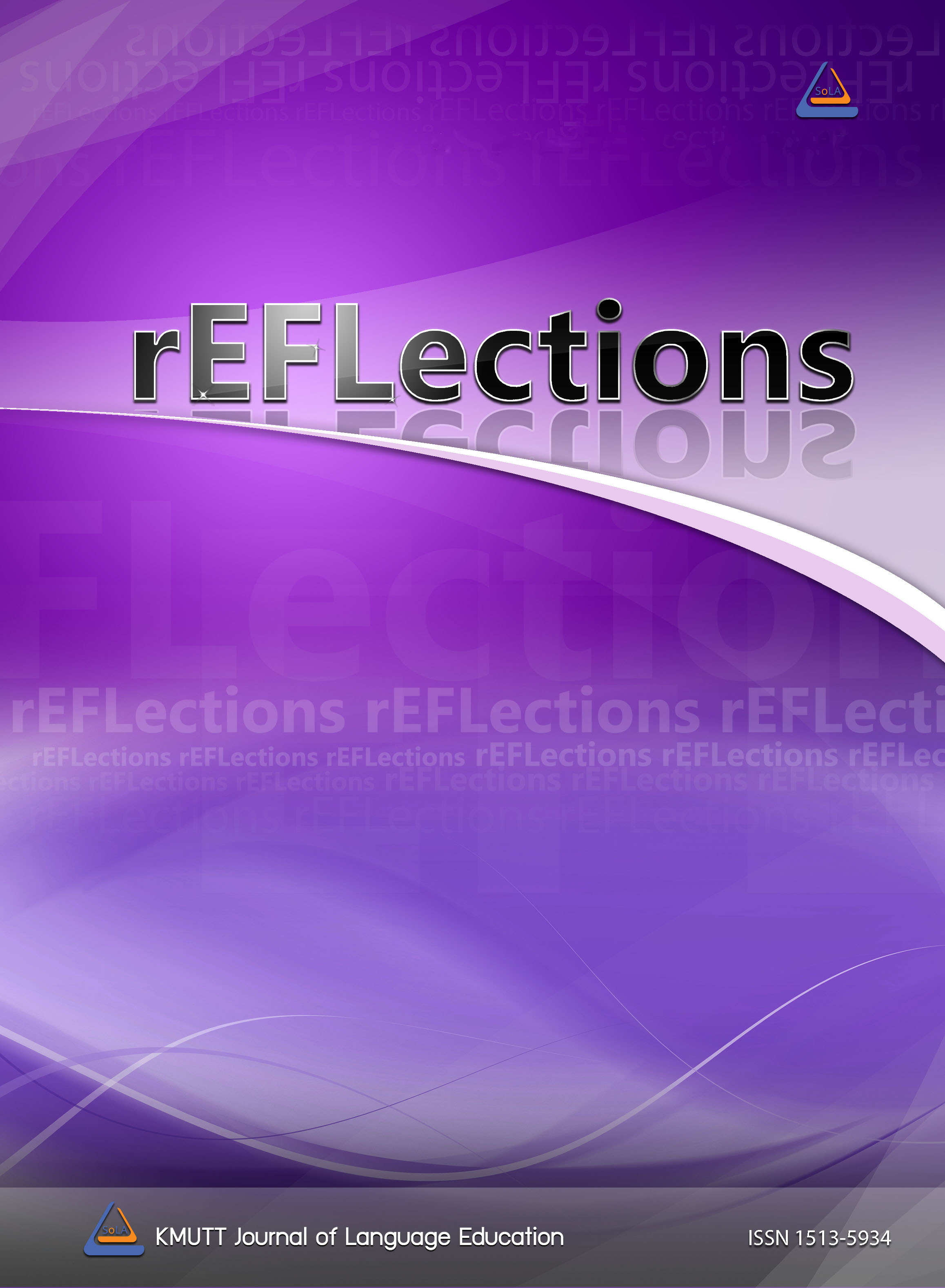Teacher Cognition of EFL Assessment: A Case Study of Professional Development on Performance-based Language Assessment in Japan
Main Article Content
Abstract
This qualitative study, conducted in Hokkaido, Japan, concerns the investigation of the teacher cognition and practice of English as a Foreign Language (EFL) assessment and the impact of a professional development (PD) program on the participants. The PD program was carried out as a series of seven in-service workshops with five native speakers of English teaching in Japanese schools and universities. The workshops aimed to provide these teachers with a basic theoretical and practical understanding of performance-based language assessment. Another major purpose of the PD was for the teachers to conduct research and publish a paper concerning language assessment. In the study, the recording of teacher reflections was used as the data collection method. From the analysis of the data, the findings show that the PD program has positively affected the teachers. They have learned about alternative ways to assess the students, gained greater self-reliance, and became confident as teacher-assessors.
Article Details

This work is licensed under a Creative Commons Attribution-NonCommercial-NoDerivatives 4.0 International License.
References
Abu-Alhija, F. (2007). Large-scale testing: Benefits and pitfalls. Studies in Educational Evaluation, 33(1), 50-68. https://doi.org/10.1016/j.stueduc.2007.01.005
Black, P., & Wiliam, D. (1998). Assessment and classroom learning. Assessment in Education: Principles, Policy & Practice, 5(1), 7-74. https://doi.org/10.1080/0969595980050102
Black, P., & Wiliam, D. (2009). Developing the theory of formative assessment. Educ Asse Eval Acc, 21(5). https://doi.org/10.1007/s11092-008-9068-5
Borg, S. (2006). Teacher cognition and language education. Continuum.
Borg, S. (2015). Researching language teacher education. In B. Paltridge & A. Phakiti (Eds.), Research methods in applied linguistics: A practical resource (2nd ed., pp. 541-560). Bloomsbury.
Borg, S. (2018). Evaluating the impact of professional development. RELC Journal, 49(2), 195-216. https://doi.org/10.1177/0033688218784371
Borg, S. (2019). The impact of language teacher professional development. In G. Barkhuizen (Ed.), Qualitative research topics in language teacher education (pp. 44-49). Routledge.
Brindley, G. (2001). Language assessment and professional development. In C. Elder, A. Brown, E. Grove, K. Hill, N. Iwashita, T. Lumley, T. McNamara & K. O’Loughlin (Eds.), Experimenting with uncertainty: Essays in honour of Alan Davies (Vol. 11, pp. 137-143). Cambridge University Press.
Broadfoot, P., Daugherty, R., Gardner, J., Harlen, W., James, M., & Stobart, G. (2002). Assessment for learning: 10 principles. University of Cambridge School of Education.
Burns, A. & Khalifi, H. (2022). Engaging action research to explore use of assessment for improving language ability. In A. Burns & H. Khalifi (Eds), Second language assessment and action research (Vol. 48, pp. 1-16). Cambridge University Press.
Büyükkarci, K. (2014). Assessment beliefs and practices of language teachers in primary education. International Journal of Instruction, 7(1), 107–120. https://eric.ed.gov/?id=EJ1085246
Chinda, B. (2009). Professional development in language testing and assessment: A case study of supporting change in assessment practice in in-service EFL teachers in Thailand [Doctoral dissertation, University of Nottingham]. Nottingham eTheses. https://eprints.nottingham.ac.uk/10963/
Chinda, B. (2014). Teachers’ reactions towards performance-based language assessment. PASAA: Journal of Language Teaching and Learning in Thailand, 48, 57-88. https://eric.ed.gov/?id=EJ1077896
Chinda, B., Cotter, M., Ebrey, M., Hinkelman, D., Lambert, P., & Miller, A. (2022). Reactions of teachers and students towards the implementation of performance-based language assessment: A washback study in Hokkaido, Japan. LEARN Journal: Language Education and Acquisition Research Network, 15(1), 524-547. https://eric.ed.gov/?id=EJ1336154
Corbin, J., & Strauss, A. (2008). Basics of qualitative research: Techniques and procedures for developing grounded theory (3rd ed.). Sage.
Crandall, J. (2000). Language teacher education. Annual Review of Applied Linguistics, 20(1), 34-55. https://doi.org/10.1017/S0267190500200032
Crandall, J. A., & Finn M, S. (2014). Effective professional development for English as a second/foreign language teachers. In M. Celce-Murcia, D. M. Brinton & M. A. Snow (Eds.), Teaching English as a second or foreign language (4th ed., pp. 630-648). National Geographic Learning/Cengage Learning.
Dörnyei, Z. (2005). The psychology of the language learner: Individual differences in second language acquisition. Lawrence Erlbaum.
Guskey, T. R. (2000). Evaluating professional development. Corwin Press.
Hamp-Lyons, L. (2003). Writing teachers as assessors. In B. Kroll (Ed.), Exploring the dynamics of second language writing (pp. 162-189). Cambridge University Press. https://doi.org/10.1017/CBO9781139524810.012
Hamp-Lyons, L. (2007). The impact of testing practices on teaching: Ideologies and alternatives. In J. Cummins & C. Davison (Eds.), International handbook of English language teaching (Vol. Part I, pp. 487-504). Springer. https://doi.org/10.1007/978-0-387-46301-8_35
Hinkelman, D., & Cotter, M. (2018). Balancing real-time vs. post-performance feedback for EFL presentation classes. In P. Clements, A. Krause & P. Bennett (Eds.), Language teaching in a global age: Shaping the classroom, shaping the world (pp. 369-380). JALT. https://jalt-publications.org/articles/24396-balancing-real-timevs-postperformance-feedback-efl-presentation-classes
Inbar-Lourie, O. (2017). Language assessment literacy. In E. Shohamy, I. Or & S. May (Eds.), Language testing and assessment, Encyclopedia of language and education (3rd ed., pp. 257–270). Springer. https://doi.org/10.1007/978-3-319-02261-1_19
Kagan, D. M. (1992). Implications of research on teacher belief. Educational Psychologist, 27(1), 65-90. https://doi.org/10.1207/s15326985ep2701_6
Lynch, B. K. (2001). The ethical potential of alternative language assessment. In C. Elder, A. Brown, E. Grove, K. Hill, N. Iwashita, T. Lumley, T. McNamara & K. O’Loughlin (Eds.), Experimenting with uncertainty: Language testing in honour of Alan Davies (Vol. 11, pp. 228-239). Cambridge University Press.
Malone, M. E. (2008). Training in language assessment. In E. Shohamy & N. H. Hornberger (Eds.), Encyclopedia of language and education (2nd ed., Vol. 7, pp. 225-239). Springer Science+Business Media.
Mann, S. (2005). The language teacher’s development: State-of-the-art article. Language Teaching, 38, 103-118. https://doi.org/10.1017/S0261444805002867
Pajares, M. F. (1992). Teachers’ beliefs and educational research: Cleaning up a messy construct. Review of Educational Research, 62(3), 307-332. https://doi.org/10.3102/00346543062003307
Taylor, L. (2013). Communicating the theory, practice and principles of language testing to test stakeholders: Some reflections. Language Testing, 30(3), 403–412. https://doi.org/10.1177/0265532213480338
Woods, D. (1996). Teacher cognition in language teaching: Beliefs, decision-making and classroom practice. Cambridge University Press.

